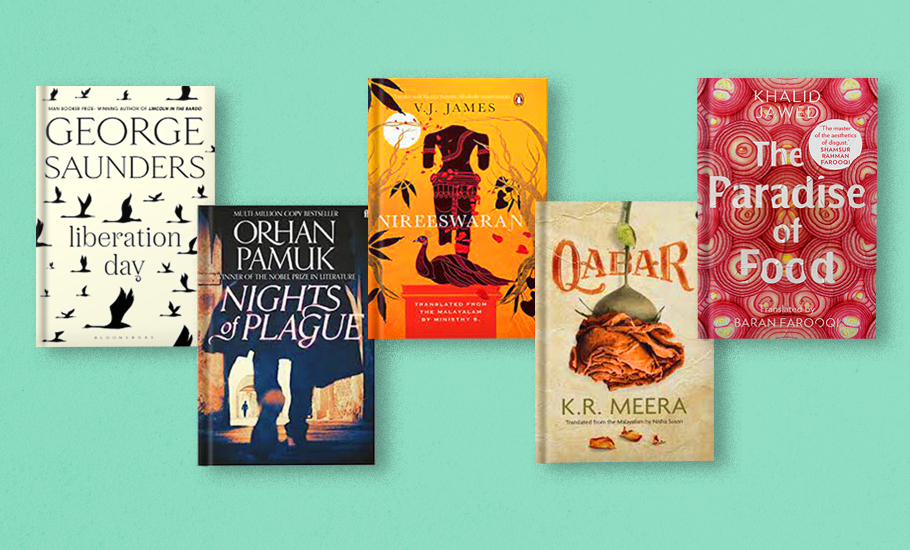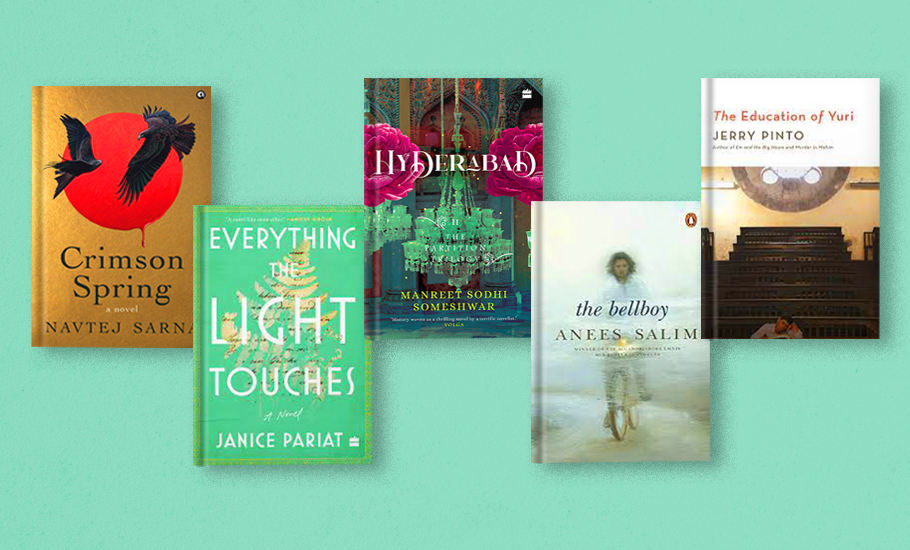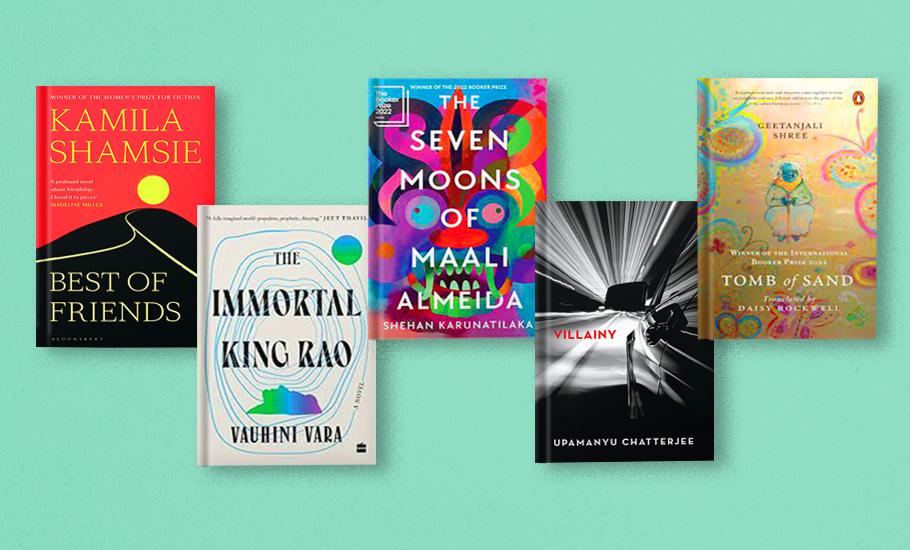
The Federal’s 15 notable books (fiction) of the year 2022

1. Nireeswaran by V.J. James, translated from Malayalam by Ministhy S. (Penguin Random House India): In his third novel to be translated into English — close on the heels of his last work, Anti-Clock, which tackled the big questions of life and death — celebrated Malayalam novelist and short story writer V.J. James proposes the idea of the un-god to shine light on the commercialisation of religion. Laced with his trademark incisive humour and satire, it is an indictment of blind faith and explores a novel idea of spirituality that resonates with our times — rife with religious frenzy.
2. Liberation Day: Stories by George Saunders (Bloomsbury): Five years after he won the Booker Prize for his first novel, Lincoln in the Bardo, American writer George Saunders — master of the short fiction form — returned with a book of short stories, his first after the 2013 collection, Tenth of December. The nine speculative stories — revolving around love and loss, longing and the need to connect — bristle with his characteristic wit and empathy. They further cement his reputation as the chronicler of “the lost, the unlucky, and the disenfranchised,” who writes with a moral heart.
3. Nights of Plague by Orhan Pamuk, translated by Elkin Oklap (Faber): This historical novel from the Turkish Nobel laureate, set on the imaginary island of Mingheria at the twilight of the Ottoman Empire, tells the story — in many different voices — of a community ravaged by an incurable disease and the enforced isolation. The year is 1901. Half of Mingheria’s population is Muslim, and the other half is Orthodox Greeks. And the tension between the two is high. Like most of Pamuk’s novels, it’s allegorical, and unravels both as a detective story and an epic.
Also read: ‘Novelist as a Vocation’ review: How Murakami animates the surreal world of his fiction
4. The Paradise of Food by Khalid Jawed, translated from Urdu by Baran Farooqi (Juggernaut): Khalid Jawed is one of the most extraordinarily inventive Urdu writers. His stories, centred on existential issues, stand out for ingenious style that experiment with form and content. Paradise of Food, winner of the JCB Prize, is the translation of his classic novel, Nemat Khana — an exploration into how food corrupts human life. Unfolding in an atmosphere of gloom, it’s told in the voice of a middle-class Muslim man, who recounts his story from childhood to senility: a tale in which the kitchen becomes the site of violence and gore.
5. Qabar by K.R. Meera, translated from Malayalam by Nisha Susan (Eka): The novella by one of the most prolific Malayalam writers was published in 2020. Though running into a little over 100 pages, there is a lot that it unpacks: from the issues of law and land to patriarchy and the subjugation of women. As the foundation is laid for a temple on the site of Babri Masjid in Ayodhya, a rumble begins in a small town in Kerala, which reveals the ‘hard truths about the intertwined histories of Hindus and Muslims in India, as well as the chasms between men and women.’

6. Best of Friends by Kamila Shamsie (Bloomsbury): The London-based British-Pakistani writer, who won the Women’s Prize for Fiction Home Fire (2017), published her eighth novel, which blends the joys of friendship and the trappings of power. Two young women, born and raised in Karachi, navigate their friendship in the city of their upbringing — where they witnessed Benazir Bhutto, a woman, being elevated to the top echelon of power — and then again, decades later, in London. It is a lacerating story that draws on identity and the workings of memory.
7. The Seven Moons of Maali Almeida by Shehan Karunatilaka (Penguin Random House): This year’s Booker Prize winner is a searing satire and a grim state-of-the-nation novel set amid the mayhem of the Civil War in Sri Lanka. The afterlife noir is narrated by the ghost of Maali Almeida, a war photographer, gambler, and closet gay. After waking up in the celestial visa office, he rushes against time to know who killed him as the suspects are far too many. He has seven moons to reach out to the man and woman he loves the most and resolve the mystery of his own death. Karunatilaka’s narrative, suffused with mordant wit, evokes the horrors of war.
Also read: Inside the violent, visceral world of Cormac McCarthy, one of America’s greatest writers
8. The Immortal King Rao by Vauhini Vara (HarperCollins India): Among the most assured and exciting debuts of the year, The Immortal King Raoby the former Wall Street Journal technology reporter, is a multi-generational saga that delves into the age of technological capitalism and the end of human civilisation. After King Rao, who is born into a family of Dalit farmers and grows up on a South Indian coconut plantation, falls from grace as top CEO in the US and the leader of a corporate-led government, retreats into exile on an island. Narrated by Athena, Rao’s daughter, the story intertwines the history of a newly independent India and the birth of the Shareholder Government in the US.
9. Villainy by Upamanyu Chatterjee (Speaking Tiger): Drawing on his years in the Indian Administrative Service, Upamanyu Chatterjee, who is best known for his debut English, August(1988), has been crafting fiction that captures the darkness of bureaucratic India. Villainy, his seventh novel, is a literary thriller that draws on his observations of the business of black money and the Indian prison system. A tale of crime and punishment, it is a portrait of a city (Delhi) where evil is rampant and where crime is linked to the chasms of class.
10. Tomb of Sand by Geetanjali Shree, translated by Daisy Rockwell (Penguin Books): Geetanjali Shree, who has been writing for nearly three decades, became the first Hindi writer to win the International Booker prize for her fifth novel, Ret Samadhi, which was described by the Booker jury as “an urgent yet engaging protest against the destructive impact of borders, whether between religions, countries or genders.” It is the story of an 80-year-old woman who travels to Pakistan to reclaim her true identity, seeking a new life, overcoming her descent into depression after the death of her husband.

11. Crimson Spring by Navtej Sarna (Aleph Book Company): A fictional retelling of the Jallianwala Bagh massacre by diplomat-turned-author, Crimson Spring vividly portrays the horror of April 13, 1919, when General Dyer ordered his troops to open fire, without warning the crowd to disperse. Intensely researched, and lucidly told, it approaches the tragedy through the eyes of nine characters — from the powerful British officials to common Indians, whose lives were upended in its aftermath. In Sarna’s account of the horrific incident, it’s the heroism of the ordinary men and women that shines through.
12. Hyderabad by Manreet Sodhi Someshwar (HarperCollins India): The second part of Someshwar’s ambitious Partition trilogy, centred on the human suffering in the wake of the subcontinent’s most tumultuous historical event, revisits the annexation of Hyderabad by the Indian Union, and the human costs it entailed. Set in the months right after the Partition, it tells the story of the eventual surrender of the whimsical seventh Nizam, Nawab Sir Mir Osman Ali Khan Siddiqi, and the trail of bloodshed the invasion unleashed, resulting in the massacre of over 27,000 lives.
Also read: ‘The Secret of More’ review: This novel explores how Indian cinema came to life
13. The Education of Yuri by Jerry Pinto (Speaking Tiger Books): The third novel by the author of the Em and the Big Hoom (2012) is a bildungsroman conceived as an ode to the Bombay of the 1980s, brimming with the manic energy of poets and college-goers; poets like Adil Jussawalla, Nissim Ezekiel, nd Eunice de Souza play cameos. Revolving around the socially inept but precocious 15-year-old boy (Yuri Fonseca) the tale of friendship and politics, love and loss is as richly constructed as his first novel. The novel’s delicate emotional fibre, wit and compassion establish Pinto as a writer of human emotions.
14. Everything The Light Touches by Janice Pariat (HarperCollins India): Pariat’s third novel Everything the Light is an elegant, inventive and charming tale of the human-nature bond. Genre-fluid and interspersed with poetry, letters, diary entries and drawings, it is the story of four people who never cross paths but are united by a similar quest. “All is leaf,” Goethe had written in The Metamorphosis of Plants. To Pariat, a novelist with a poetic eye, “all is resonance, all is connection.” While it touches upon a wide range of themes, including the colonial-modern and rural-urban divides, at its core it’s a novel that contrasts two ways of seeing: “those that fix and categorize and those that free and unify.”
15. The Bellboy by Anees Salim (Penguin Random House): The latest novel by the Kochi-based fiction writer traverses a territory familiar to his readers: like most of his novels, The Bellboy is preoccupied with morbid melancholy. An intriguing exploration into death, it is the coming-of-age story of a 17-year-old boy, Latif, who lives with his widowed mother and two younger sisters on the imaginary Manto Island. His life is upended when he gets the job of a bellboy at Paradise Lodge, a rundown hotel where people check into with the intent to kill themselves. Told with wry humour, it’s a poignant commentary on the vulnerabilities of the innocent and the plight of India’s religious minority.


